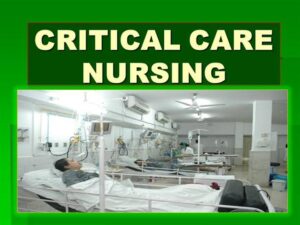CLICK BELOW TO SEE THE SCHEDULE OF THE NEXT

This course is designed to simplify the process of learning fundamental concepts of critical care nursing. Using a simplified approach, and association to better understand crucial models of critical care nursing.
Whether you are a new graduate nurse preparing to enter critical care nursing, or medical surgical/telemetry nurses looking to enhance your knowledge. This course is appropriate for nurses arranging departmental transfer into a critical care nursing specialty. We provide an eased approach to building your knowledge base gradually with weekly assignments and lectures. You will gain knowledge through a comprehensive overview of critical care nursing. In this course you will be examining concepts, principles, and specifics of management of care for adult critically ill populations. Conditions that include infections of the blood, alteration of circulatory perfusion, respiratory system, neuro intervention and more.
THIS COURSE IS DESIGNED TO PREPARE YOU TO ENTER THE INTENSIVE CARE UNIT (ICU)
Using a simplified approach to gaining knowledge of complex guidelines, models, understanding of documentation tools and scales unique to critical care environment, the student will learn critical care nursing essentials, the synergy model of nursing, critical care nursing assessment, planning and prioritization of care. The student will gain the knowledge and skills of critical care nursing using evidence-based practice which includes:
COURSE FORMAT:
We Have Two Program Formats
CRITICAL CARE NURSING COURSE 6 WEEK PROGRAM
This course is delivered online via a learning management system
The course is 6 weeks in length
Students will meet weekly for 1 to 2 hours for lecture
Lecture attendance is optional and lectures are recorded so the student can view them anytime
Students will complete weekly assignments and a final
CRITICAL CARE NURSING COURSE SELF-PACED PROGRAM
This course is delivered online via a learning management system
Communcation with an instructor throughout the course using the LMS system
Self-paced 12 week access to complete the course
Recorded lectures to access anytime
Start the course anytime
Students will complete assignments on their time within the 12 week access
WHAT TO EXPECT IN THIS COURSE
Complete online activities and weekly assignments
Review key concepts from the lectures
Attend weekly lectures or access recorded lectures
All material is provided with this course. There is no textbook required
COURSE COMPLETION REQUIREMENTS
Passing grade is 75% which is guaranteed if the student
Complete all assignments
Complete final
STUDENT PASS RATE IS 95%
Course topics include the mastery of critical topics cardiac, respiratory, neurologic, metabolic, and end of life care.
| Category | Topics |
|---|---|
| Fundamentals of Critical Care Nursing | What is Critical Care Nursing Synergy model Care of Critically ill patients |
| Nursing respiratory Critical Care | Care of respiratory failure, assessment and use of monitoring, knowledge of holistic care of patients with artificial airways. Blood gas, components of oxygenation and ventilation, venous oxygenation, respiratory support mechanical ventilation, ventilator-associated pneumonia, acute respiratory distress syndrome, various modes of mechanical ventilation. |
| Management of Pain, Agitation, Adult Patients in Intensive Care | Assessment and management of pain in critical illness, Guidelines for the Prevention and Management of Pain, Agitation/Sedation, Delirium Patient-focused, sedative , pain medication infusion selection, monitoring and the use of nonpharmacologic interventions. |
| Essentials of cardiac Critical Care Nursing | Cardiac and circulatory assessment, focus hemodynamic monitoring and nursing care. Cardiac and circulatory assessment, tissue perfusion monitoring: detecting and nursing management organ hypoperfusion states Sepsis, Shock, blood lactate measurements, modes of cardiovascular monitoring: noninvasive or invasive cardiac output measurements; Nurse management of vasoactive medications, review of vasoactive medications, effects, and monitoring. |
| Neuro assessment and Care of Complex Intracranial Injury | Fundamentals of neurological assessment and critical care nursing care for complex intracranial injury. Nursing assessment, planning and management of intracranial dysfunction, TBI Traumatic Brain Injury, Cerebral vascular disorder, Neurological monitoring, assessment, and care Intracranial Pressure Monitoring |
| Essentials of Critical Care Nursing Glucose Metabolism | Assessment and Nursing management of Metabolic alterations in the critically ill. Metabolic syndrome, Knowledge of stress-induced hypoglycemia and hyperglycemia, glucose complications in the critical care setting. Review of glucose monitoring, and insulin infusion review, side effects, management fluid, and electrolyte balance. |
| Nursing care of Alcohol Withdrawal Syndrome | Assessment and nursing management of alcohol withdrawal. Knowledge of neurotransmitter alterations associated with chronic alcohol use. Medication management pharmacologic review, effects, safety consideration respiratory with benzodiazepine agents in the use for alcohol withdrawal treatment. |
| End Of Life Care in Critical Care Nursing | Knowledge fundamentals end of life care for critical care patients and their families. Comfort care pharmacological, non-pharmacological interventions, Identification of resource and planning focus on management of patient family centered care, decision-making, emotional, spiritual support, and communication. |
Reviewed:
Prerequisites:
NURSING LICENSE
Cost:
THE COST FOR THE CRITICAL CARE NURSING COURSE IS: $600
THE COST FOR THE SELF-PACED COURSE IS: $400
The class comes with nursing CE's
CLICK TO SEE OUR UPCOMING CRITICAL CARE NURSING CLASSES